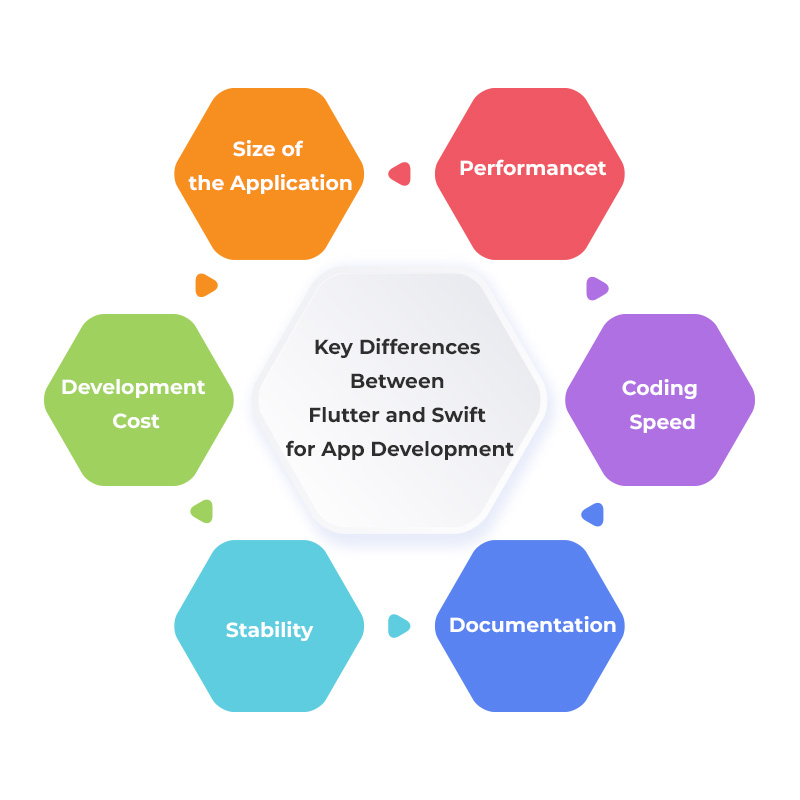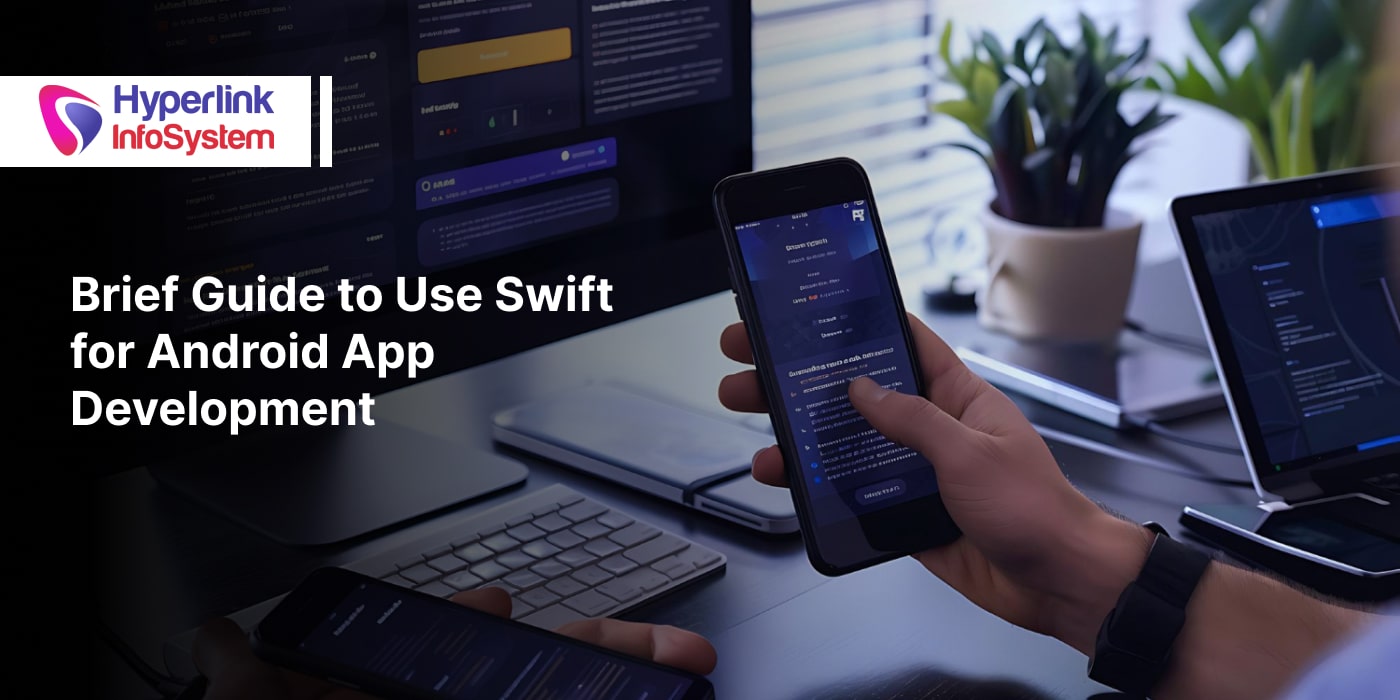Are you confused about selecting the most preferred programming language to develop the iOS application?
When it comes to iOS application development, developers are always trying to find the most suitable technology to enhance and optimize iOS applications. In the current iOS mobile app development landscape, Swift and Flutter are two of the most popular programming languages. There are many mobile app development companies, that specialize in creating the top iOS applications. Some businesses specialize in creating the top iOS applications. You can hire mobile app developers who can develop high-performing apps.
Before comparing Flutter and Swift, we must first define these programming languages. Flutter is used to create both mobile applications including iOs and Android. Swift is a native language that is used to develop iOS applications. While each of these programming languages has its advantages and disadvantages, the best option simply depends on the needs of the project.
In this article, we will provide a detailed introduction to Flutter and Swift, as well as we’ll explore their advantages. The essential distinctions between Swift and Flutter will be discussed in this article. As a result, whether you're an
iOS app developer weighing two options or a mobile app developer interested in the most recent developments in mobile app development, this article can help you decide which technology is appropriate for your upcoming project.
Swift: What Is It?
Swift is one of the most popular programming languages that is used to develop iOS applications. It’s a powerful, reliable, and fast language. They are also introducing new features every time that provide a better experience to develop a platform using Swift. The technology behemoth Apple has made several improvements to the language, including the most latest frameworks, tools, and documentation to make working with locals simpler.
Swift is also famous due to its simplicity and robust features which make it a good choice to develop applications with Swift. We can find many mobile applications, desktop programs & apps, and also a cloud-based platform that is developed using Swift.
With features like optional, which helps you avoid runtime issues, and strong typing, which helps to catch errors at compile time, Swift was created with safety in mind. Swift includes all of the capabilities found in modern programming languages, including generics, closures, and optional chaining, which boost the flexibility of
Swift app development. Hire iOS developers who are ready to meet your unique requirements and develop feature-rich applications for your target audience.
What are the Advantages of Swift for Mobile App Development?
Swift's syntax is distinguished by its conciseness and expressiveness. As a result, less code is required to do the identical task in Objective-C. It is optional for developers to track and manage memory manually. This can be done automatically using automated reference counting (ARC).
Swift was developed with speed and performance in mind. It was developed to perform better than Objective-C, which it replaced. When it was first released, it touted being 40% faster than Objective-C. It accomplishes this by incorporating optimizations for frequent operations and employing contemporary programming paradigms, such as protocol-oriented programming.
Swift is still very much compatible with Objective-C even though it was designed to replace it. On projects that are being updated or extended, you can collaborate with Objective C on them. Swift is compatible with dynamic libraries, which makes it simple to combine with other platforms and languages.
-
Ensure Strong Typing and Safety
Swift uses a strong type system, which helps catch problems at build time and guarantees safer code. Runtime crashes are less likely, and code stability and dependability are improved.
-
Optimizing Native Performance
Swift enables high-speed execution and optimization, which leads to quicker app launches, fluid animations, and increased performance in general. It was created with the use of current compiler technology, which optimized the code for performance.
-
Strong Ecosystem and Many Libraries
Swift contains various libraries, frameworks, and different tools in their ecosystem to develop iOS applications. With the access of Apple API library, it’s facilitates users to develop specific features of any platform easily. Swift is optimized for the development of native iOS apps and provides a stronger connection to Apple's ecosystem.
Hire Swift developers who possess extensive experience and expertise in leveraging cutting-edge Apple technologies, such as Swift programming language, SwiftUI, Xcode, and more.
Flutter: What is It?
Open-source software development kit Flutter is used mainly for cross-platform development. Flutter, developed and maintained by Google, is a popular tool for creating extremely effective hybrid applications. Dart is the language used by Flutter, and it has one codebase. You may also get thorough documentation for each development project from the platform. React Native, a well-known iOS development platform, and Flutter are quite similar.
Flutter is incredibly helpful because it allows the construction of both iOS and Android apps from a single source code. Users of Flutter are developing a large and active community. Hybrid app development will become more dynamic as a result.
Hire Flutter app developers who help to bring your idea into reality.
What are the Advantages of Flutter for Mobile App Development?
The hot reload feature in Flutter allows developers to view instant changes in the app's UI as they adjust the code, making development faster and more efficient.
-
Development for Several Platforms
Flutter enables developers to save time and work by writing a single codebase for both the iOS and Android platforms. You can reach a broader audience thanks to cross-platform interoperability.
The architecture of Flutter, which incorporates a layered approach as well as its rendering engine, Skia, enables smooth animations and high-performance user interfaces. It offers native-like performance, removing the need for JavaScript bridges.
-
Exceptional UI/UX Capabilities
Flutter provides a robust set of customizable UI widgets, enabling developers to construct aesthetically appealing interfaces. It also supports a wide range of animations, gestures, and effects, which improves the entire user experience.
Users of low-end technology have high standards for the performance of their equipment. In other words, if your app is too slow, customers may switch to a competitor's app.
The cost of developing a single platform application can be frightening for a startup. One of the key reasons businesses love Flutter is that it reduces the expense of developing and maintaining many versions of an app. You don't need a large team to build an app with Flutter. This is a huge relief for many firms catering to Android and iOS consumers.
The enormous Flutter community contributes to the framework's ongoing progress. Some of the most well-known state managers, such as Riverpod and BLoC, which are still used by Flutter developers today, were established by community members using stand development practices. They provide free information and great development tools for Flutter developers, as well as assistance with StackOverflow questions.
Key Differences Between Flutter and Swift for App Development

A significant amount of time has passed since Flutter and Swift first appeared in the tech landscape.
Both Flutter and Swift have been in the tech marketplace for a considerable time frame.
Flutter and Swift have both been around for a long time in the tech world. While Flutter aids in reducing development time. Swift necessitates a greater time investment. Now that we have a general grasp of the two, let's look at a deeper Flutter versus Swift comparison on key aspects to better understand the metrics.
Flutter is a tiny runtime that allows you to create small and speedy mobile applications on a budget. It features a variety of techniques and optimizations, such as tree sharing and code spitting, that help to reduce the application's footprint even more.
Swift, a native iOS framework, facilitates the creation of lightweight and effective iOS applications. Its compiler aids in performance optimization and application size reduction. Additionally, a variety of optimization methods, including whole-module and link-time optimization, are available. These assist in further lowering Swift apps' application size.
You should be aware that, when it comes to the performance difference between Flutter and Swift, the fact that Swift is the standard language for iOS apps offers a significant benefit. For tasks requiring a lot of computation power, you can anticipate better execution. Swift might be the superior option in terms of performance. Every mobile app performance indicator must now be taken into consideration.
But Flutter doesn't lag. Dart first employs a waste specialist. The second is the establishment of AOT (early), which enables prompt communication with the device. Except for when you need to utilize the iOS platform, Flutter will operate virtually identically to native Swift.
Swift is a fantastic and efficient coding language for building an iOS app from the ground up. Additionally, it functions well, but altering the code requires more time and effort. Swift developers, on the other hand, assert that development time is shortened and that application development efforts can be readily increased. An iOS app's initial build goes without a hitch.
In contrast to Flutter, which lacks libraries, navigation tools, and testing tools, Flutter is supported with a variety of widget alternatives. UI element refinement is not a concern for Flutter developers. This is so that Flutter can automatically perform it for them. The time it takes to see recent code changes is reduced using Flutter's HOT RELOAD feature. Therefore, changes happen considerably more quickly. When compared to the same code written in Swift for an application, the equivalent app function in Flutter can be achieved with fewer lines of code.
The Swift.ORG platform and organization are crucial to the Swift community. Swift has approximately 830 contributors, and there are almost 2600 active viewers, according to GitHub statistics. The most well-known code and question exchange platform, Stack Overflow, has over 230 thousand queries that are labeled with the phrase SWIFT.
Even the Flutter figures shown offer equally useful insight. has roughly 770 active contributors for Flutter, and watched about 3400 on GitHub. Less than 70 thousand queries have the tag "Flutter" in them. Less flutter-related complications are common.
The entire Flutter community keeps an eye on Slack and Google Groups. Flutter is more community-friendly because it is open-source.
On their websites, both of these technologies have offered in-depth documentation. Programmers and developers can simply access these. You should use the swift.org platform to get Apple's developer documentation. You also need to visit Flutter. dev for Flutter. Both offer developers and programmers thorough documentation materials online.
Even though both of these technologies are relatively new and immature, they do not cause any stability difficulties. All of the platforms' components are maintained by professionals who claim to utilize them daily. Swift, as a native solution for iOS app development, should be more robust and dependable than Flutter. But that is only if you can identify and hire a Swift app developer with years of experience in iOS app development and design. This will assist you in making the most of Apple's platforms and solutions.
These are both open-source technologies. As a result, there is no additional cost to use these platforms. With increasing competition for skilled developers, hiring qualified developers is now easier than ever. The overall cost of developing an iOS app will not be prohibitively expensive. However, for comparable price points, you can reach more consumers by developing two apps with Flutter. One for the Android platform and one for the iOS platform, both at no additional cost to you.
Wrapping Up
In conclusion, you may design mobile apps using either Flutter or Swift; the decision comes down to your preferences and needs. Swift offers native performance, a strong type system, and advanced programming tools like Xcode, while Flutter offers cross-platform development, quick reloading, rich widgets, and faster development. Finally, your preferences and the requirements of your app will dictate which option you choose. To help you acquire confidence and advance with your Flutter development depending on your needs and specifications, you may get in touch with the best Flutter app development company.
Hire Flutter developers who can provide greater efficiency with a single codebase and wider reach without sacrificing user experience. Whenever you hire a mobile app development company, you gain access to a dedicated team of experts. Mobile app designers must stay on top of the latest innovations and trends in the industry. To ensure that your mobile application maintains its excellence and usability, Hyperlink Infosystems' team of experts provides application design, quality control, ongoing support, and maintenance.
Hyperlink InfoSystem has the talent and resources to realize your idea, whether you're looking to
hire iOS developers, Flutter developers, or an entire app development team.
Get in touch with us right away to start a remarkable path of invention, creativity, and success. The future of mobile app development begins here!
























